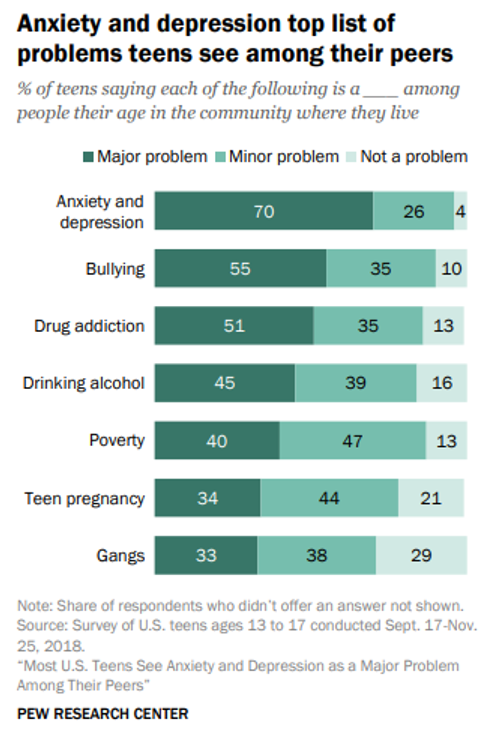 Back in February, the hashtag #ilovepublicschools trended on Twitter, but for reasons not intended by the originators. Many students used the hashtag as a vehicle to speak out about the bullying, homophobia and depression experienced by their peers.
Back in February, the hashtag #ilovepublicschools trended on Twitter, but for reasons not intended by the originators. Many students used the hashtag as a vehicle to speak out about the bullying, homophobia and depression experienced by their peers.
This startling phenomenon encouraged a deeper look at the data, as well as realization of the fact that anxiety and depression were maladies spreading among American teens before the pandemic.
A fall 2018 Pew Center survey of teens 13 to 17 years old queried them on a variety of issues and asked them to describe those issues as “not a problem, a “minor problem” or a “major problem” among people their age in their community. Seventy percent of teens declared anxiety and depression a major problem; only 4 percent said it was not a problem.
Stark as these numbers are, they don’t suggest that the school system was the problem. Studies have linked teen use of social media to anxiety and depression, especially among teenage girls. Going forward, the idea should not be to assign blame but rather to improve matters.
For every teen in the Pew survey who said bullying was not a problem, 5.5 teens said it was a major problem, indicating a massive bullying issue. Indicative of another major issue is the fact that for every student surveyed who said drug addiction was not problem, four said that it was.
Many students seek transfer opportunities for social rather than academic reasons. A productive line of inquiry for researchers would be to compare the survey results on these topics for students who have had the chance to avail themselves of such opportunities to those who have not.
The opportunity to transfer out of a bad situation may not be a perfect solution in all cases, nor should ensuring it for all students represent the totality of our efforts. It almost certainly, however, improves the lives of a great many students.
When we (finally) get past the current epidemic, this previous one will still be there waiting for us.
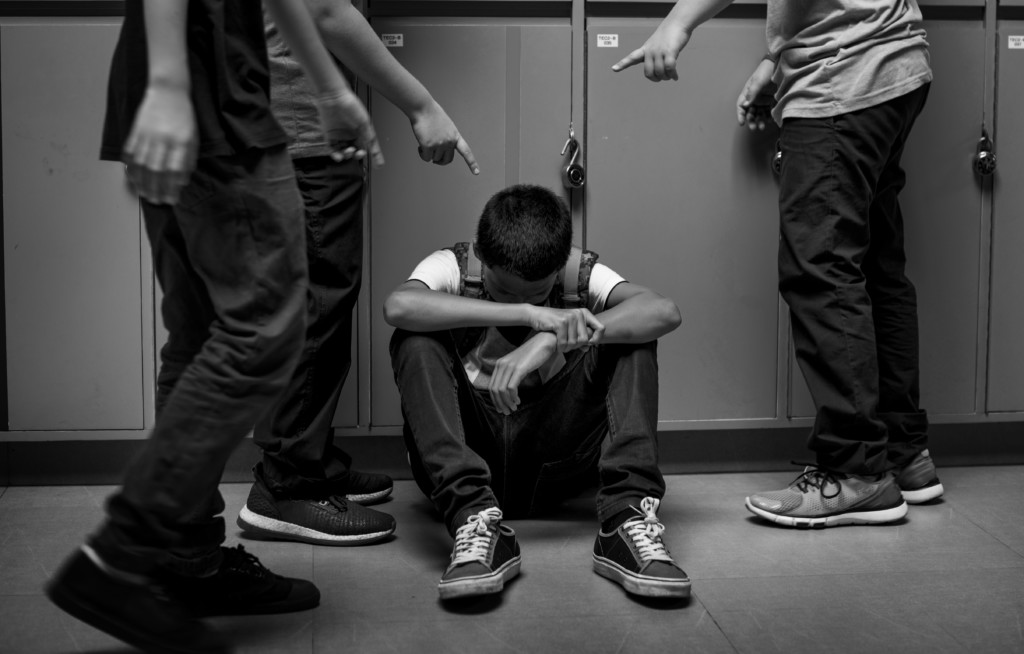 Recently, the hashtag #ilovepublicschools trended on Twitter, but perhaps not in the way intended.
Recently, the hashtag #ilovepublicschools trended on Twitter, but perhaps not in the way intended.
My intent in sharing a sample of what happened when public school students and parents began weighing in is not to bash public schools. I am a public school graduate, my mother worked in the public school system, and all three of the Ladner children have attended public schools. Many people do, in fact, love their public schools, and you can see evidence of that if you visit the hashtag.
But you also will hear from people who are miserable in their public schools.
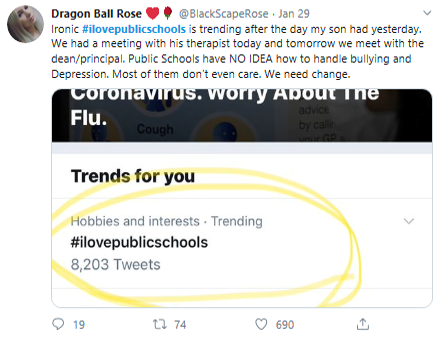
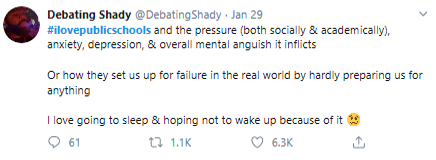
Several of the #ilovepublicschools participants wrote about being bullied because of their sexual preference or disability status.

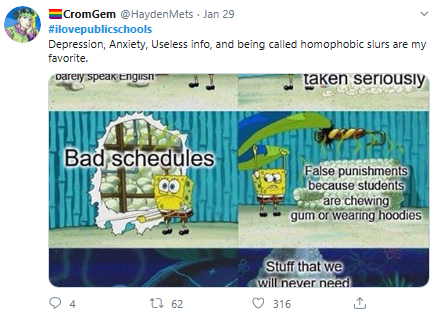
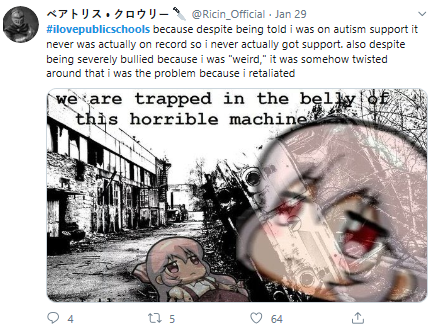

Again, I do not present these examples as a gratuitous attack on public schools, but rather to make the point that a great many families desperately need new schooling situations.
A scroll through #ilovepublicschools makes it clear just how profoundly misguided the current media campaign in Florida is to persuade companies not to make donations to scholarship programs. Students suffering from bullying, anxiety and depression often desperately need a new school. LGBTQ students are disproportionately the victims of such bullying. Tax credit scholarships are given to students in an entirely neutral fashion, and LGBTQ students are now using tax credit scholarships to attend schools that work for them.
Students like Elijah Robinson, for instance, who was featured on redefinED in October.
A successful campaign to dissuade companies from donating to the Florida Tax Credit Scholarship program will defund the scholarships of thousands of desperate students, students in situations like Elijah’s, and indeed, Elijah himself. If anyone can tell me Elijah Robinson should have been denied the opportunity to attend The Foundation Academy after having been relentlessly bullied at his previous school, the comment section awaits your explanation.
I fear there are people in our society so filled with hate for education choice programs that they would look Elijah Robinson in the eye and tell him, “You can no longer attend The Foundation Academy because of the decisions of unrelated third parties. Go back to the school whose students and staff drove you to the brink of suicide.”
I sincerely hope, dear reader, that you are not one of those people. If you are, I hope that God will shine a light into your soul that will allow you to rediscover your humanity.
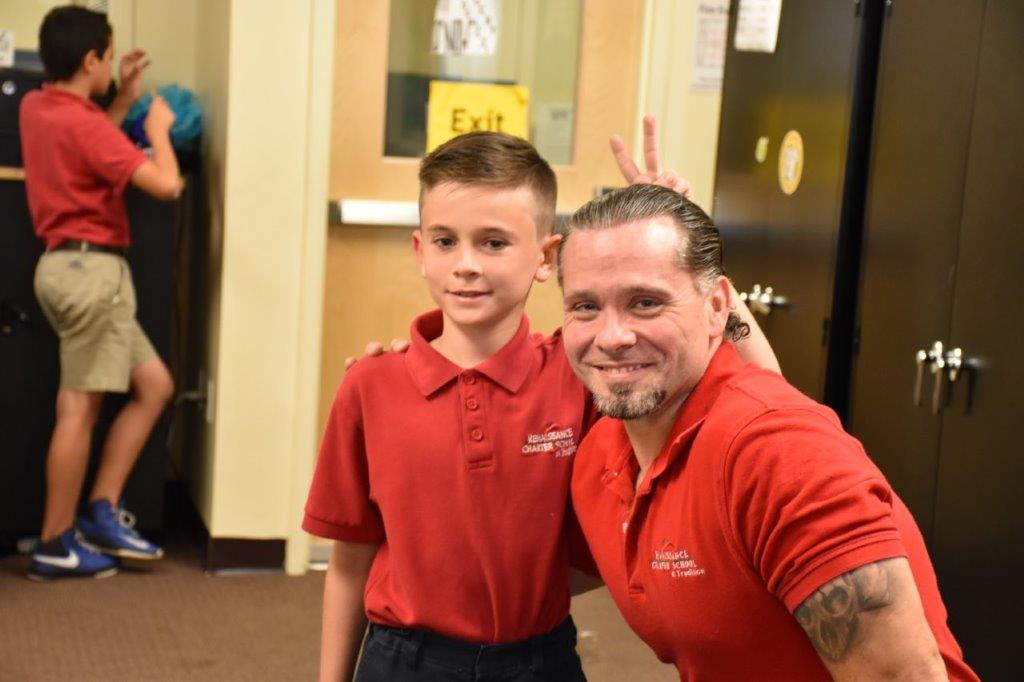
Dylan Stanton refers to educator Glenn Goodwin as "The God of Teachers." Once bullied, Dylan has thrived at Renaissance Charter School at Tradition.
Editor’s note: Throughout July, redefinED is revisiting stories that shine a light on extraordinary schools. Today’s spotlight, first published in August 2018, relates how a third-grader who experienced bullying was able to thrive after enrolling in Renaissance Charter School at Tradition in Port St. Lucie.
Dylan Stanton was routinely bullied at his former school. A boy in his third-grade class hit him, pushed him off benches, stole his money. Once, he rammed Dylan face-first into a fence.
At the same school, another student once held a sharp metal file to the throat of his older sister Kaitlyn.
Not surprisingly, they did not thrive there.
But now, Dylan, 11, and Kaitlyn, 13, are safe and learning on an accelerated path, thanks to Renaissance Charter School at Tradition. It’s a K-8 charter school in Port. St. Lucie, Florida, which they’ve attended for two years.
“My friend kept telling me about this school, the tutoring and after-school programs and all the extra help,” said Jennifer Stanton, their mother. “I contemplated for a while, but the bullying at the other school helped me make up my mind.”
“We’ve been very happy here. They’re just easier to work with. They’re open to ideas and parent involvement.”
Accessing a new school did more than help the Stantons overcome bullying.
A few years ago, Dylan was diagnosed with dyslexia and attention-deficit hyperactivity disorder (ADHD). At his former school, he struggled in math and was reading below his grade level.
Renaissance placed him in an online after-school reading program called Reading Plus, which develops a student’s silent reading stamina and fluency, while building vocabulary and comprehension, increasing their confidence and expanding their interests.
Thanks largely to his reading gains, Dylan’s grades have soared – along with his self-confidence. He loves science fiction and imagines a space-traveling future.
“I want to be the first person to step on Mars – to colonize Mars,” he said, adding he wants to pilot the rocket that takes him there.
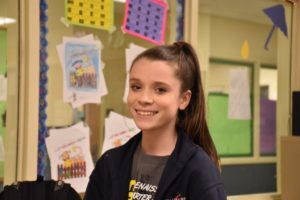
Kaitlyn Stanton used to hate going to school, until she attended Renaissance Charter at Tradition, where her reading scores soared.
Kaitlyn, an eighth-grader, exhibited some of the same learning difficulties as Dylan, but not as severe. Her mother said the turbulent environment at her old school made her anxious. She, too, struggled most with reading, but Reading Plus has benefited her, as well.
But now “she’s now well above where she needs to be,” said reading teacher Andrea Ortega.
That has “made everything much easier” academically, Jennifer Stanton said.
“She used to hate school and hated to read,” she said. “I think this has given her the confidence to push herself in school.”
Kaitlyn is a dancer who specializes in ballet, jazz, acrobatic and lyrical dancing (but “hates” tap). While she hasn’t settled on a possible future career, she knows she wants a job that will someday enable her to buy a Range Rover.
This fall, she’ll attend St. Lucie West Centennial High School. It’s a district school where she was accepted into the Cambridge Advanced International Certificate of Education Program, which offers challenging college-level classes for high school students.
Kaitlyn spoke of her future between classes, while students wearing red, white or blue polo-style Renaissance shirts passed by in orderly, single-file lines.
The charter school is located in a rapidly developing area of Port St. Lucie, on Florida’s east coast between West Palm Beach and Vero Beach.
The 64,466-square-foot, two-story facility opened in 2013. A tuition-free public charter school, it’s governed by Renaissance Charter Schools, part of the Charter Schools USA network. The district recently renewed it for 15 years. In 2016-17, the state rated it a B academically.
Principal Stacy Schmit said the school strives to make the personal connections with students and parents that are key to student success. She credited Stanton for having high expectations for her children and working in tandem with their teachers.
“She very much empowers the kids to be drivers of their own education,” Schmit said. “She’s a great mom and she pushes them.”
Renaissance also has a Cambridge program. It’s available to third- through fifth-graders and aims to develop critical-thinking skills and encourage collaboration. Last year, Stanton urged Dylan to apply, and he was accepted.
“There are more projects and it’s an accelerated class,” said Glenn Goodwin, Dylan’s fifth-grade teacher. “Dylan’s definitely in the upper range of where he needs to be. He’s gone up in (every subject) over last year, but he’s had the most gains in reading and science.”
Dylan calls Goodwin “The God of Teachers.” Stanton credits him for engaging Dylan’s interests.
At 5-foot-7, Goodwin, 42, is powerfully built, with a large tattoo on his left arm and an upbeat personality to match his youthful energy. He’s well-known for enhancing classroom studies with real-life stories from his globetrotting life. For years, he lived and traveled in Thailand, Ecuador and South Korea, among other countries, where he taught English with his wife.
During a recent lesson on animal behavior, he described what happened when he and his wife got off his motorcycle in Thailand to feed monkeys.
While Renaissance has helped Dylan and Kaitlyn flourish academically, it’s also helped with needs beyond the classroom.
Jennifer Stanton’s mother and uncle both recently died, and she was diagnosed with a heart condition. In December, as the family was heading to Renaissance for “Breakfast with Santa,” their car was totaled in a multi-vehicle crash.
A single mother who works as a nurse, Stanton couldn’t afford Dylan’s hyperactivity medication for a month as she searched for a new car. The other challenges made it difficult for her to juggle her kids’ schedules.
Kaitlyn has dance classes a few days a week and played on the school’s volleyball team. Dylan participates in wrestling, baseball, football and tae kwon do.
Stanton turned to her best friend, Karla Nelson, who’s also the school nurse. When Stanton’s mom was hospitalized for extended periods, Nelson and her husband, who have three kids of their own, stepped up to care for Dylan and Kaitlyn.
“It truly takes a village to help raise children,” Stanton said. “This school is like family.”
About Florida’s charter schools
Florida is home to more than 650 public charter schools, enrolling more than 280,000 students. Sixty-two percent are black or Hispanic; more than half qualify for free- or reduced-price lunches. As of September 2017, the state classified 171 charter schools as academically high-performing.
BELLE GLADE, Fla. – When she’s in class, the look on Armani Powe’s face is solemn, focused. She doesn’t harden her gaze intentionally. It happens naturally.
“When it comes to my grades,” she says, “I get really serious.”
Armani, 12, turns quiet and a little withdrawn when asked about the bullying she endured in second grade at her neighborhood school.
“It makes me all sad just to remember it,” she explains with the distance of several years.
She doesn’t mind telling the story, though, because she’s happy, safe, and thriving now at a private school. A Florida Tax Credit Scholarship from Step Up For Students was the vehicle. (Editor's Note: Step Up For Students hosts this blog.)
Armani had one bully with a band of two or three other boys who delighted in embarrassing her daily. They mocked her crooked teeth, her clothes, hair, backpack. Anything and everything and nothing.
She admits she was an inviting target.
“Looking back at my little self, I was quiet and nice and always doing my work, studying all the time, reading a book in class, and not talking,” she said. “That’s probably why they picked on me.”
The taunting chipped away at her self-image. The worst was how she felt about her teeth. She kept asking her mom when she could get braces, but they were too expensive.
One day, Armani was crying when her mother, Roline Powe, was called early to pick her up. Armani said she didn’t want to go to school anymore. She showed her mom a red hand print on her face where her bully had just slapped her.
That was it.
Roline had requested meetings before, but school officials never filed reports. They always promised they would handle it.
“They just downplayed everything,” she said. “I went in at least five times.”
She felt a nauseating mix of anger and guilt in her stomach. She couldn’t stop thinking about the braces she couldn’t afford.
“It was the most horrible thing to not be able to give your child the care they need,” she said. “But not only was she teased, she was hit! All because of her appearance.”
Determined to fix the situation herself, Roline went to nearby Glades Day School to see if private school could be an option. Everyone in this small town knows about Glades Day and its reputation for preparing children for college, trades, and agriculture careers.
She was nervous when she went in for a meeting. A friend who sent her daughter to GDS had told Roline the price of one year’s tuition, and she nearly buckled.
“I could only dream,” she said.
But it came true when an administrator told her about the scholarship from Step Up For Students. It gives lower-income families the power to choose the school that best suits their children’s needs.
This school year, the state instituted the HOPE Scholarship to give victims of bullying the option to transfer to another public school or to an approved private school as soon as their scholarship is approved.
Roline is glad to see the new scholarship in place. It might have helped prevent some of the trauma Armani endured in the weeks after she was slapped.
“It was the hardest thing getting through that year,” said Roline, who was then a substitute teacher at the neighborhood middle school and now works as an assistant teacher. “There were times I had to take a day off of work, go there, and monitor without her seeing me. I’d watch the playground from the parking lot. Sometimes I picked her up 10 minutes early.”
“It was a journey. She made it through, but if she had remained there, she probably would have needed some therapy.”
As it turned out, Glades Day School was all Armani needed.
Head of School Amie Pitts, herself a graduate of Glades Day, has carefully crafted a safe space for learning. Character isn’t just emphasized, it’s talked about by the student body on a weekly basis.
“Environment is a very big deal, and this is a different environment,” she said. “Our mission is a safe family environment, and I think we do a very good job. We pride ourselves on family. We see it as a partnership between the home and the school to raise great kids who are successful in life.”
There’s a friendly feeling that swirls through the school buildings along with the strong breeze that pushes from massive Lake Okeechobee to the north. The 30-acre campus is buttressed by cane fields to the south and east, and a sugar mill looms large across the street with smokestacks constantly churning. It’s a reminder of a life in the fields that Roline so badly wants her children to avoid.
It didn’t take long for Armani to adjust. She quickly went from tentative to curious about her new school. Soon, she was talking to others without feeling scared. They were small steps.
Every Wednesday, students wear orange shirts that say “Bullying” or “Cyberbullying” in a circle with a slash through it. Every Friday, the student body gathers to talk and lift each other up.
“We talk about kindness first,” Armani said. “People talk about what we do and should do in the world. We get it right.”
By the time Armani started her second year, she was joined by older brother Lorenzo and younger brother Shemar.
“It was the best decision I could have made for my family,” Roline said. “And for Armani, it was a game-changer.”
Roline said Glades Day has made her a better, more attentive parent. She doesn’t just help with homework anymore, she has a presence at the school. Everyone knows her as “Momma Powe.”
“She is extremely engaged,” Pitts said. “She’s here every day. She’s at every single sporting event, comes to all the meetings, reads to her son in the media center. She wants better for her kids, and they’re doing very well.”
Armani is a solid B-student striving for more. She asks for help whenever she struggles with a subject. She wants to be a veterinarian someday.
She feels safe now, settled. She has learned how to be brave and confident.
When she looks back at her little self from second grade, she feels a profound difference that goes beyond her long limbs and strong shoulders. She’s comfortable in her own skin and doesn’t worry about her appearance.
Braces fixed her teeth a couple of years ago, and she must be one of the only pre-teens around who’s excited to get them put on for a second time.
“I have a big, cheesy smile,” she said. “My friends love when I smile.”
She does it all the time. Just not when she’s focused in class.
About Glades Day School
Now in its 53rd year, GDS moved from Pahokee to Belle Glade in 1973. The school is accredited by the Florida Council of Independent Schools. Teachers have an average of 20 years of experience. Nineteen GDS employees are graduates. There are 257 K-12 students, including 94 on Step Up For Students Scholarships. The school has a thriving Agri-science program that’s tied to the Future Farmers of America and features welding, gardening, even a hog pen to train students in Grades 7-12. There are also four computer labs and smartboards in several classrooms. Dual enrollment, Advanced Placement and virtual school courses are offered. The Stanford 10 test is administered every March. Annual tuition is $7,800 for K-5; $8,800 for 6-8; and $9,800 for 9-12 with financial aid available. Transportation is available as far east as Royal Palm Beach and as far west as Clewiston.
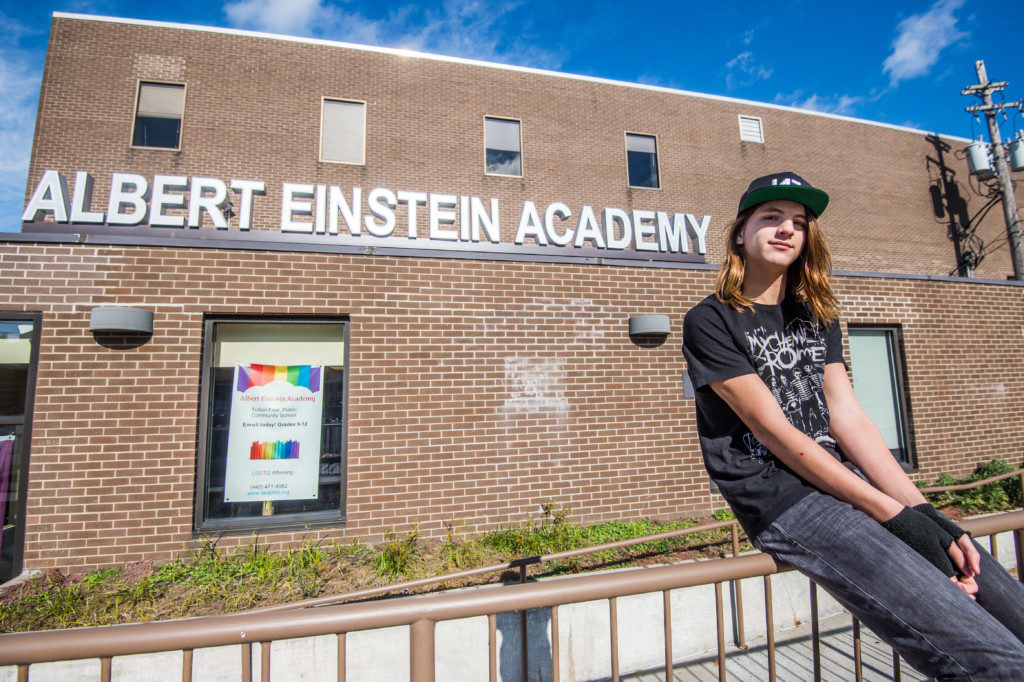
Kasey, 14, is one of nearly 40 students enrolled this fall at the Albert Einstein Academy, a charter school serving mostly LGBTQ students in metro Cleveland. (Photo by Ken Blaze.)
LAKEWOOD, Ohio – Last June, Kasey, 14, was walking to the bus stop, en route to an LGBTQ center, when the sign came out of nowhere. It was emblazoned with rainbow colors, in a window of the block-long building that houses a warren of doctor’s offices, a Brown Sugar Thai … and now, a new school.
“Albert Einstein Academy,” it said. “LGBTQ Affirming.”
For Kasey, dreading yet more bullying in a district school, the sign might as well have said, “LIFE SAVING.”
The Albert Einstein Academy is a charter school. It opened in August to serve mostly LGBTQ high school students in metro Cleveland. Nearly 40 enrolled this fall; another 15 signed up to enter as ninth graders next fall. About 80 percent, like Kasey, identify as LGBTQ.
The school’s emergence in a leafy, Midwestern suburb has drawn little attention, but it spotlights a tangle of thorny issues. The high rates at which LGBTQ students are harassed. The fear it could get worse given a national climate growing less tolerant. The extent to which school choice can be part of the solution.
There’s a Florida connection, too. This fall, the Sunshine State began offering a private school choice scholarship for bullying victims – the first of its kind in the nation – that is drawing praise and scrutiny. Praise, because it’s giving desperate students and parents more options. Scrutiny, because while some of those options are LGBTQ friendly, others are not.
These issues aren’t black and white, but they may be life or death. Perhaps nobody understands the complications better than LGBTQ students who’ve been bullied, and whose parents now have options – even if it’s one option – they didn’t have before.
Ultimately, said Henry, an 18-year old junior at Albert Einstein Academy, who’s been in five schools in the past five years, “There’s a need for a school where people can feel like they belong.”
***
Over the past few decades, America has radically changed its attitude about all things LGBTQ. To take views on same-sex marriage as but one indicator: Twenty years ago, Americans opposed the idea 62 percent to 35 percent, according to Gallup. Now they support it, 67 to 31.
Yet for many LGBTQ students, schools are still war zones.
LGBTQ students are two to three times more likely to experience bullying than non-LGBTQ students. The most recent survey from the LGBTQ student advocacy group GLSEN, released Oct. 15, offers plenty of painful details.
Nearly 60 percent of respondents felt unsafe at school because of their sexual orientation, while 45 percent felt unsafe because of their gender expression. One in three missed at least one day of school in the past month because they felt unsafe or uncomfortable. One in 10 missed four or more days. LGBTQ students in public schools reported higher rates of hostility than peers in private schools, including faith-based schools. But it’s clear no school sector is immune.
It’s also clear the repercussions are tragic. LGBTQ students are three times as likely as non-LGBTQ students to suffer from depression or anxiety, and more than twice as likely to experiment with drugs and alcohol. Only a third report being happy. And while 15 percent of non-LGBTQ high school students considered suicide over the past year, 40 percent of LGBTQ students did.
That’s worth repeating.
Every year. Forty percent. Consider suicide.
***
Kasey is tall and slim, with kind eyes, black Converses, and enough lovable slacker aura to conjure Keanu Reeves in “Bill & Ted’s Excellent Adventure.” It’s hard to imagine how a kid this funny and warm could be so filled with hurt they spent middle school careening from one fight to another. But it’s a fact.
There’s the boy they popped for calling a friend a crack whore. The boy with the wire-rimmed glasses they punched so hard, metal sliced his cheek. The boy they tried to tackle after a lunchroom taunt, “tray lady,” that was meant to demean more than their long hair. (more…)

The Hope Scholarship is the nation's first scholarship for bullied students. More than 46,000 Florida students in district schools were subjected to harassment, bullying or violence in the '15-'16 school year.
Florida families can now begin applying for the first scholarship in the nation for students in K-12 grades who are bullied.
The Hope Scholarship gives parents of eligible students victimized by bullying the opportunity to choose a participating private school and receive a state-supported scholarship to attend. The program also allows parents to transfer their child to another K-12 public school with available capacity within the school district, or to receive funding to transport the student to a public school in another district.
Rep. Byron Donalds, R-Naples, who sponsored the bill this spring creating the scholarship, said he wants to gives parents choice.
“My hope is that parents get all the information they need to act in the best interests of their children,” said Donalds. “We should look for ways to empower parents at all times with respect to the education of their children. This is one of the tools in the tool box for parents to be empowered.”
The new program is administered by Step Up For Students, a nonprofit that also publishes this blog, and applications on the organization’s web site went officially live to all families this morning. (more…)

The Hope Scholarship is for K-12 students victimized by bullying. Fundraising officially began October 1st - the beginning of National Bullying Prevention Month.
Fundraising officially began Monday for the first state-supported school choice scholarship in America aimed at helping K-12 students victimized by bullying.
The Hope Scholarship gives parents of eligible students the opportunity to find a safer learning environment among private schools participating in the program. It also allows parents to transfer their child to another K-12 public school with available capacity within the school district, or to receive funding to transport the student to a public school in another school district.
The scholarship was created by the Florida Legislature last spring, signed into law by Gov. Rick Scott, and will be administered by Step Up For Students, a nonprofit scholarship funding organization. (Step Up also hosts this blog.)
It will be funded by purchasers of motor vehicles who, starting today, can designate up to $105 of sales taxes on those purchases to Step Up.
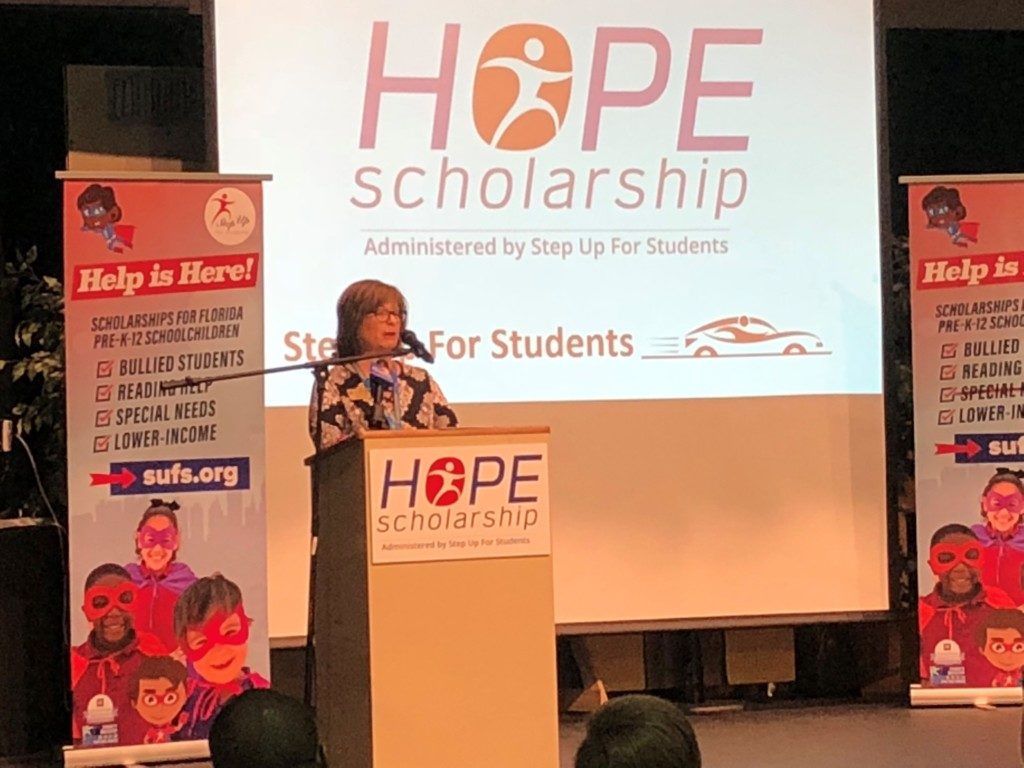
Fundraising for the Hope Scholarship kicked off Monday, October 1st with an event at De LaSalle Academy in Fort Myers.
Representatives from Step Up and Rep. Byron Donalds, R-Naples, who sponsored the Hope legislation, kicked off the program Monday at De LaSalle Academy of Fort Myers, a school for students with special needs that will be participating in the Hope program.
By coincidence, October is National Bullying Prevention Month.
“I think it’s a wonderful idea. An awesome idea,” said parent Jennifer Cotrell, whose daughter, Paige, was bullied in her prior school because of her learning disability. Although she looked like a neurotypical student, Paige’s thought processing was slower than her classmates. Sometimes she would repeat sentences, or not understand questions asked by her classmates. Always trying to fit in, she was also susceptible to peer pressure which only made the bullying and teasing worse.
Now she attends De LaSalle with help from another choice scholarship, the Gardiner Scholarship for students with special needs. Said Cotrell, “There is nothing worse than a kid who doesn’t want to go to school because of how they are treated there.”
Bullying is an age-old problem, but some evidence suggests it’s on the rise. (more…)
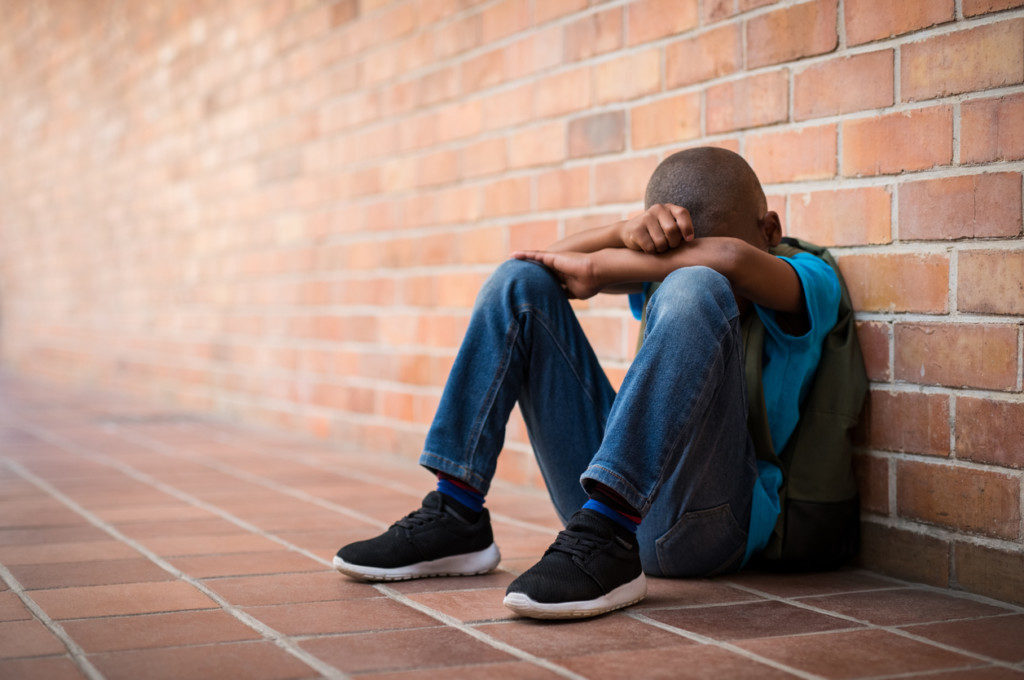
Students at private schools, for example, were 8 percent more likely to have never experienced physical conflicts, 28 percent more likely to have never experienced another student possessing a weapon on campus, and 13 percent more likely to have never experienced racial tension between students.
As the nation’s first private school scholarship for bullied students shifts into higher gear, a new study finds that private schools are more likely than public schools to offer safer learning environments.
Private schools are far less likely to report problems such as physical conflicts, robbery, drug abuse, possession of illegal weapons, and bullying, according to researchers Danish Shakeel and Corey DeAngelis, in a recently published report in the Journal of School Choice.
The researchers examined responses to the national School and Staffing Survey from both public and private schools, including self-reported safety practices, and occurrence of problems and crime. Even when controlling for school-level characteristics, private schools came out ahead. (more…)
JACKSONVILLE – The rock seemed to come out of nowhere, startling the boys walking home from school in the calm of an October afternoon. It hurtled inches from Michael Palmertree’s shoulder, hitting his friend, who fell unconscious with a wound to his head.
Michael checked to make sure his younger brother, Johnathan, was unharmed. Then he reached for the cell phone his mom had given him for emergencies and called 911.
It didn’t occur to Michael as an ambulance arrived that the rock had been intended for him or Johnathan, but his mother knew better. Tammy Alam had been worried since the start of the 2016 school year that they had been targeted by bullies. That’s when she enrolled her boys at their district school after relocating the family from Maine.
At first, she told herself it was because they were new to the school. She encouraged them to ignore the taunts and name-calling. But as the bullying escalated – tripping and shoving in the hallways, ripped backpacks – Tammy became convinced the abuse against 11-year-old Michael, who is part white and part African-American, and 7-year-old Johnathan, who is part white and part Asian, was racially motivated.
On the afternoon of the rock throwing, Tammy realized further discussion with school personnel was useless. She considered homeschooling, but as a single mom working full time, she worried she wouldn’t have enough time. Then she remembered the school three miles from the family’s apartment, which she drove past every day. (more…)
Editor's note: About 200 people who support Florida's tax credit scholarship program, including many scholarship students themselves, attended yesterday's legislative committee hearing on a bill to expand the program. Many speakers made many good points, but a woman from Ocala stole the show. The audience applauded her, lawmakers praised her, reporters quoted her. Here is what Chanae Jackson-Baker told the committee. Her remarks were edited slightly for length and clarity.
I worked 12 hours last night in Gainesville. I drove to Ocala to get my kid to school, then drove to Tallahassee to be here. That’s how important this is to me.
We keep talking about money, we keep talking about the money. The children are an investment. ... I pay $500 a month over what the scholarship covers. ... Because we’re putting in more, and investing more, we are willing to give more.
I don’t know about anybody else’s private school, but the one my children attend, they took the Stanford 10, which is actually a lot better ... than the FCAT. I keep hearing talk of the FCAT. When my son took the FCAT in third grade, he was doing horrible. He was doing horrible because he had auditory processing disorder. He has dyslexia. He’s on the autism spectrum. When he was in public school, and I hate to bash public school because I was the parent on SAC committee and PTO before I gave up on public school … He left public school reading at third grade, four month level in sixth grade. He’s now in seventh grade and he’s on level. I never thought I’d see my son read a book.
I have my step daughter … she came from a public school. She missed 85 days in kindergarten. No one stepped in. No one. She almost flunked out of kindergarten. She’s now in her school. She’s now excelling.
It’s not just education. It’s character. When my eight-year-old and my nine-year-old come to talk to me about integrity, when they talk about being good to people, when they talk about there being a family at school, that’s what this scholarship is all about. (more…)